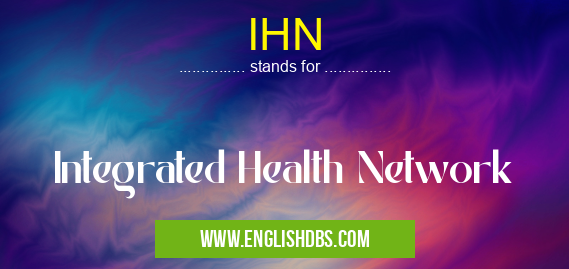What does IHN mean in HEALTHCARE
In the realm of healthcare, acronyms and abbreviations are widely used to streamline communication and simplify complex terms. IHN (Integrated Health Network) is one such abbreviation that holds significant importance in the industry. Understanding its full form and meaning in the context of medical services is crucial for effective healthcare delivery and patient care.

IHN meaning in Healthcare in Medical
IHN mostly used in an acronym Healthcare in Category Medical that means Integrated Health Network
Shorthand: IHN,
Full Form: Integrated Health Network
For more information of "Integrated Health Network", see the section below.
» Medical » Healthcare
Meaning of IHN in MEDICAL
IHN stands for Integrated Health Network. It is a healthcare delivery model that focuses on coordinating and integrating various aspects of healthcare services to provide comprehensive and patient-centered care. The core principle of an IHN is to create a seamless and coordinated system that eliminates fragmentation and improves the overall patient experience.
Key Features of an IHN
- Collaboration: IHNs promote collaboration among different healthcare providers, including physicians, nurses, specialists, and allied health professionals.
- Coordination: They coordinate care across multiple settings, such as clinics, hospitals, long-term care facilities, and home health agencies.
- Patient-Centered Care: IHNs emphasize patient-centered care, focusing on the individual needs and preferences of each patient.
- Shared Information: They utilize electronic health records (EHRs) or other platforms to share patient information securely among providers, ensuring continuity of care.
- Cost Efficiency: By integrating services and reducing duplication, IHNs can improve cost-effectiveness and reduce healthcare expenses.
Benefits of IHNs
- Improved patient outcomes due to coordinated and comprehensive care.
- Enhanced patient experience through seamless transitions between care settings.
- Reduced healthcare costs by eliminating unnecessary tests and procedures.
- Increased provider satisfaction through improved collaboration and communication.
- Better population health management by coordinating preventive care and disease management programs.
Challenges of IHNs
- Establishing and maintaining effective collaboration among diverse healthcare providers can be challenging.
- Implementing and integrating EHRs and other information-sharing systems can be complex and time-consuming.
- Overcoming regulatory and reimbursement barriers to ensure financial sustainability can be an ongoing issue.
Essential Questions and Answers on Integrated Health Network in "MEDICAL»HEALTHCARE"
What is the Integrated Health Network (IHN)?
The Integrated Health Network (IHN) is a comprehensive healthcare system that aims to provide patients with seamless and coordinated care across various settings. It encompasses hospitals, clinics, primary care facilities, and other healthcare providers, all working together to offer a wide range of medical services.
How does the IHN benefit patients?
The IHN provides several benefits to patients, including:
- Improved access to healthcare services, reducing wait times and travel distances.
- Enhanced coordination of care, ensuring that patients receive the appropriate treatment from the right providers at the right time.
- Integrated electronic health records, allowing for secure and efficient sharing of medical information among healthcare providers.
- Personalized healthcare plans that address individual patient needs and preferences.
- Reduced healthcare costs and improved health outcomes through preventive care and early intervention.
Who is eligible for IHN services?
Eligibility for IHN services varies depending on the specific network and its partnering healthcare providers. In general, individuals who reside within the geographical area served by the IHN may be eligible for its services. Some IHNs may also have additional eligibility criteria, such as income or health insurance status.
How do I access IHN services?
To access IHN services, you can contact your primary care physician or the IHN directly. The IHN will assess your needs and connect you with the appropriate healthcare providers and services within the network.
What types of services are available through the IHN?
The IHN offers a wide range of healthcare services, including:
- Primary care, such as checkups, immunizations, and chronic disease management.
- Specialty care, including cardiology, oncology, neurology, and more.
- Behavioral health services, such as counseling, therapy, and substance abuse treatment.
- Emergency care, including urgent care and emergency room services.
- Long-term care, such as nursing homes and rehabilitation facilities.
Final Words: IHN stands for Integrated Health Network, representing a collaborative healthcare delivery model that seeks to improve patient care, reduce costs, and enhance provider satisfaction. By coordinating services across multiple settings, IHNs aim to provide comprehensive and patient-centered care that meets the evolving needs of the healthcare industry. While challenges exist, the benefits of IHNs make them a valuable approach to improving healthcare delivery and outcomes.
